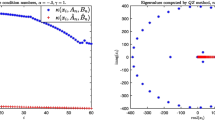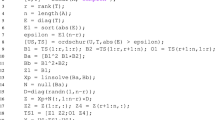Abstract
The solution of Schrödinger's equation leads to a high number N of independent variables. Furthermore, the restriction to (anti)symmetric functions implies some complications. We propose a sparse-grid approximation which leads to a set of non-orthogonal basis. Due to the antisymmetry, scalar products are expressed by sums of N×N-determinants. Because of the sparsity of the sparse-grid approximation, these determinants can be reduced from N×N to a much smaller size K×K. The sums over all permutations reduce to the quantities det K (α1,…,α K ):=∑≤i 1,i 2,…,i K ≤Ndet(a iα ,i β (αβ))α,β=1,…, K to be determined, where a i , j (αβ) are certain one-dimensional scalar products involving (sparse-grid) basis functions ϕαβ. We propose a method to evaluate this expression such that the asymptotics of the computational cost with respect to N is O(N 3) for fixed K, while the storage requirements increase only with the factor N 2. Furthermore, we describe a parallel version (N processors) with full speed up.
Similar content being viewed by others
Explore related subjects
Discover the latest articles and news from researchers in related subjects, suggested using machine learning.Author information
Authors and Affiliations
Additional information
Received July 24, 2000; revised December 5, 2000
Rights and permissions
About this article
Cite this article
Hackbusch, W. The Efficient Computation of Certain Determinants Arising in the Treatment of Schrödinger's Equations. Computing 67, 35–56 (2001). https://doi.org/10.1007/s006070170015
Issue Date:
DOI: https://doi.org/10.1007/s006070170015




